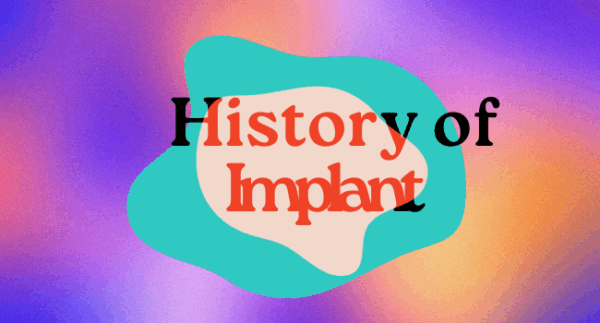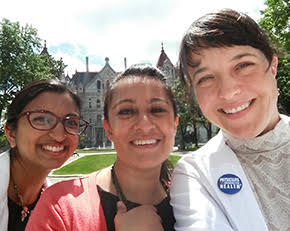Aug 14

Help Us Protect Access to Sexual and Reproductive Health Care Today!

Dr. Rupa Natarajan, Dr. Zahra Virani, and Dr. Sara Miller in front of the New York State Capital Building
Dr. Zahra Virani is one of RHAP’s Reproductive Health and Advocacy Fellows for 2014-2015. We recently asked her about her experience in reproductive health, family medicine, and advocacy with Physicians for Reproductive Health’s Leadership Training Academy.
“As a resident I was not able to get the exposure to advocacy that I would have liked. As a Reproductive Health and Advocacy Fellow, in addition to just providing patient care I learned to be an advocate for my patients. Advocacy is a central part of the program. In order to develop my advocacy skills I am participating in Physicians for Reproductive Health’s Leadership Training Academy (LTA) during my fellowship year. Whether meeting with members of Congress in D.C., or my state assembly member in Albany, New York, it has been fantastic to have that opportunity to advocate for my patients.
For my first experience with the LTA, I went to DC and received training on how to be an effective advocate, how to speak with elected officials, and how to answer difficult questions. Together with a small group of doctors, I met with members of Congress to discuss two reproductive health-related bills. We urged legislators to support the Pregnant Workers Fairness Act, which would require employers to make reasonable workplace accommodations for pregnant workers so that no woman has to choose between a healthy pregnancy and her job. We also spoke to lawmakers about why reproductive health care providers oppose legislation that would take away insurance coverage for abortion care from millions of women. Being on Capitol Hill and speaking with lawmakers and their staff about the impact these reproductive health bills would have on my patients made me realize the importance and power of being an advocate.
More recently, I went to Albany for a lobby day where I was able to meet my assembly member, Rebecca Seawright. We talked with our state representatives about the importance of insurance coverage for pregnant women and urged them to pass a law to add pregnancy to the list of qualifying events, including marriage and the birth of a child, that allow New York women to enroll in health insurance outside of the normal enrollment period. We were able to meet with Assembly Member Seawright and go to the floor of the Assembly to watch members vote on important public health legislation. On June 17, just a few weeks after our lobby day, the Senate and the Assembly passed S5972 making New York the first in the nation to pass legislation like this and remove barriers to necessary prenatal care.
As a primary care clinician you are advocating for your patients in the work you do everyday. However, it is one thing to provide health care and another thing entirely to change laws that affect health care. Through legal advocacy, you are actively creating change that will be a huge help for your patients and will help you deliver better care. Now that I have developed the skill set to advocate for my patients in Albany and in D.C., I feel confident I’ll be involved in advocacy throughout my career.”
This year, the Reproductive Health Access Project turned 10. In celebration, we set a goal of raising $10,000 during the months of May and June. A group of long-time donors pledged to give $2 for every $1 we received in May and June. Thanks to our generous supporters, we reached our goal. That means that our supporters helped us turn $10,000 into $30,000!
Over the last 10 years the Reproductive Health Access Project has worked to build a national community of abortion, evidence-based contraception, and miscarriage care providers — despite increases in legislative attacks. The Reproductive Health Access Project provides extensive support to new and experienced clinicians, many of whom are the lone pro-choice, pro-contraception providers in their communities.
RHAP is able to connect these clinicians to like-minded colleagues and help them navigate the challenges of adapting their health centers or practices to provide comprehensive reproductive health care. All donations raised in our spring appeal will go directly toward our fellowships, training programs, and advocacy work.
The Reproductive Health Access Project is guided by the belief that everyone should have safe access to abortion, contraception, and miscarriage. We are so thankful to all our supporters who have joined us in the movement to expand access to reproductive health care nationwide.
This spring comedians Betsy Kenney and Alise Morales hosted a comedy show in New York City to benefit RHAP. Over 200 people attended their event, “Sex with Betsy and Alise” and they raised $380 dollars in one night! We caught up with Betsy and Alise to find out what inspired them to host the show.
“Both of us do comedy at the Upright Citizens Brigade and we met through mutual friends,” Alise explained. “We’ve hosted shows by ourselves but we’d never worked together.” They decided they wanted to do a show that was sex-positive and highlighted reproductive health. As Betsy put it, “It’s one of the biggest things we have to fight. Reproductive rights are under attack across the country, women are losing access. It’s important to talk about it now before it’s too late.”
We asked them why they chose to donate their proceeds to the Reproductive Health Access Project. Alise explained, “I had done an event for RHAP with my friends Buzz Off Lucille last year. I really like that you guys work on all three issues – abortion, birth control, and miscarriage. I know women in my family who had to go through miscarriage in silence. I feel like it’s a hidden part of the female experience and women are expected not to talk about it.” Betsy added, “Giving money towards something like RHAP and knowing where it’s going is great. You know you are helping train people in things like abortion and miscarriage. It feels good knowing one person can help give and that we are all going to benefit from it.”
We appreciate Betsy and Alise’s generous support of RHAP so much and encourage you to learn more about these hilarious women. Betsy is currently performing at Harold Night at the Upright Citizens Brigade and Alise has a feature out on IFC’s Comedy Crib called Horrible Insane Girl.
In recent months there has been much discussion in the media about employment accommodations for pregnant women, especially surrounding the Supreme Court Case Young v. UPS. Family physicians can play an important role helping pregnant women get the appropriate workplace accommodations. Recently RHAP’s Reproductive Health and Advocacy Fellow Carrie Pierce, Medical Director Linda Prine, and Research Associate Gabrielle DeFiebre published a letter to the editor in the American Journal of Family Medicine highlighting the role of family physicians in facilitating pregnancy accommodations. Read the key points of their letter below:
“Some women may worry about whether a job that includes physical labor puts their pregnancy at risk. Patients may be reassured that prolonged working hours, shift work, lifting, standing, and heavy physical workload are unlikely to be associated with adverse pregnancy and birth outcomes such as miscarriage, preeclampsia, and low birth weight. However, if a patient develops a pregnancy-related condition, the physician should assess whether the work poses a risk to her health or whether she is able to perform the essential functions of her job. The physician should then determine whether the patient needs to take leave from work or receive accommodations. In many cases, the accommodations are similar to what would be requested for any employee with a medical condition (e.g., women with gestational diabetes may need time to check their blood glucose levels and eat a snack).
It is key for the physician to compose a well-worded letter to the patient’s employer demonstrating that the pregnancy-related condition meets the guidelines of the Americans with Disabilities Act. Certain restrictions may make it impossible for a patient to perform the essential functions of her job. For example, if a pregnant medical transcriptionist with carpal tunnel syndrome cannot type because her condition has not responded to wrist splinting and other therapies, she would need to be assigned other work duties or, if no other job is available, take a leave of absence.
It is important to delay the leave until medically necessary. The Family and Medical Leave Act requires that the employer protect the employee’s job for only 12 weeks of unpaid leave. If the employee cannot return to work after 12 weeks, the employer is not required to reinstate her. Physicians should ensure that the timing of the leave is planned with this in mind, especially because the patient may want to save the bulk of her leave for the postpartum period.”
One of the ways family physicians can maintain their clinical certification is to successfully complete Self-Assessment Modules (SAM) on core primary care topics. SAMs cover lots of topics – but NOT contraception. In the April edition of the RHAP newsletter, we sent out a call to action asking family physicians to sign a petition supporting the adoption of a Family Planning SAM by the American Board of Family Medicine (ABFM). The Reproductive Health Care Member Interest Group (MIG) of the American Academy of Family Physicians worked very hard to develop a comprehensive family planning SAM, and we are thrilled to report that 1,000 members of our family physician community demonstrated their support by signing the petition.
Unfortunately, the ABFM didn’t accept the family planning SAM proposal, claiming the focus on contraception was too narrow. In response, the authors of the original SAM have developed a Reproductive Health SAM that, in addition to family planning, would include topics such as STIs, menopause, ED, PCOS, infertility, and LGBTQ reproductive health issues, to name just a few. The group is currently awaiting ABFM’s response. In the meantime, the Reproductive Health MIG and members of the Reproductive Health Access Network are continuing advocacy work through other means, including proposing, writing, and presenting resolutions to both state and national chapters of the American Academy of Family Physicians on the importance of reproductive health training. For more information on current actions, please visit our Clinician Advocacy page.
We strongly believe that family planning is a core competency of family medicine education, and as such, we will continue to be leaders in reproductive health advocacy efforts across the country to make this a reality.
Subscribe to receive monthly updates from the Reproductive Health Access Project.
Your gift allows us to train and support health care providers across the United States so they can offer patients compassionate and comprehensive care.
Aug 14
